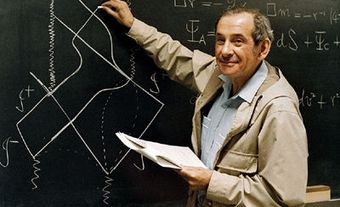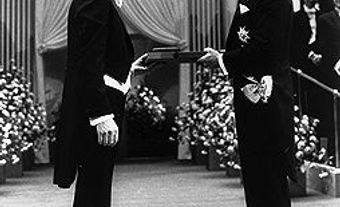This article was originally published in Maclean's Magazine on April 18, 2005
UN Designates 2005 International Year of Physics
EXACTLY 50 YEARS after his death - 100 since he stunned the world with science's most famous equation, E=mc2 - time is once again dancing to the imagination of Albert Einstein. In his honour, the United Nations has designated 2005 the International Year of PHYSICS, and there is not a developed nation anywhere, Canada included, without a full slate of public lectures, unveilings or theatrical presentations.
A prime target of all this attention is today's teens, who don't know much about Einstein save for his famous mug, and who have been shying away from physics studies as if they were energy-sucking black holes. Once the big dog of modern science, the stuff of moon shots, Cold War intrigue and Star Trek's warp speed popularity, physics has clearly lost its pre-eminence. To try to entice a younger generation back into the great mysteries of the universe, science mavens all over the globe have been busily crafting Einstein-related laser shows, computer games, communal high school projects and robotic competitions. There's even an "Einstein flip" for the BMX bike crowd who, like the great man himself, live to defy the old rules about gravity.
For enthusiasts already lost in the spacetime continuum, this year brings the fruits of NASA's much-delayed US$700-million probe, currently in orbit. Basically a giant, liquid helium-filled vacuum flask, it boasts a perfectly crafted set of gyroscopes designed to prove that most monumental of Einsteinian theories: that big objects like Earth lug their own space and time with them as they rove the universe.
Meanwhile, those who'd just like to pay a quiet, if slightly tacky, homage can join in the great light wave (http://www.wyp2005.at/ glob1-light.htm). On April 18, the anniversary of Einstein's death, his latter-day colleagues at Princeton University will flip on a series of lights that will, it is hoped, spread in relay westward across North America, then on through Japan, China, Southeast Asia and Europe before reconverging to leap yet another ocean and arrive back at Princeton 24 hours later. A kind of cosmic crowd-wave like at football stadiums, this is a tribute to a man whose inspiration, he once wrote, came from imagining what it would be like to ride a beam of light. In the process, mind you, he upended 300 years of scientific tradition, showed that light can bend and that energy and matter are flip sides of the same phenomenon, and created the understanding that led to the development of lasers, photoelectric cells and, of course, the atom bomb.
For some, like Philip Stamp, director of the Pacific Institute of Theoretical Physics in Vancouver, this year's celebrations are merely "a good excuse for a party." He's not being totally facetious. "The simple fact," he says, "is that there were two incredible revolutions in physics in the early part of the 20th century" - Einstein's theory of relativity, as well as quantum mechanics, which he helped spark but never fully came around to believing in. "To pinpoint 1905 is pushing it a little bit," says Stamp. But at the same time, he adds: "What's magic about 100 years ago is that progress was achieved. There was a succession of breakthroughs."
Others, though, are taking this year's events much more seriously, as virtually a last gasp for a revolution that - despite a smattering of glamour projects - seems in danger of petering out. "There is no question the physics community is trying to leverage Einstein," says Clifford Will, a Canadian-born physicist at Washington University in St. Louis and author of Was Einstein Right?. (Short answer: yes.) Of real concern is that doctoral degrees in the physical sciences dropped almost 12 per cent in the U.S. between 1998 and 2003, the largest decline in any field. In Canada, post-secondary enrolment in physics was a mere 3,970 students in 2001, just 2.3 per cent of the science and engineering total. (A more modest sign: of the 100,000 people who have enlisted for the around-the-world light relay, only 107 are in the U.S. - and just six in Canada.) "Without young people to keep things going forward," says Will, "the whole technological basis of a society can suffer."
One possible reason for the dropoff is that physics has become bogged down in ultra-theoretical pursuits like string theory which only a handful can understand. Meanwhile, funding and students are flowing in rivers to genetics, biology, computers, even environmental studies. Stamp, for one, is not overly perturbed at this trend. "Funding and enrolment," he says, "have nothing to do with how fundamental the questions are" - and everything to do with what government and industry want in the short term.
But does Einstein share the blame for today's woes? Did he, for all his contributions, ultimately lead physics into a black hole? Certainly his life had a remarkable arc: from obscure 26-year-old patent clerk in 1905 to Nobel Prize winner in 1921, celebrity scientist, arch-humanitarian and peace activist and, every mother's favourite, the archetypal late bloomer who didn't do well at school.
Physicists are right to call 1905 his "miracle year." In the space of about nine months, he wrote and published four papers in a German journal that redefined the way light travelled (both as a wave and in discrete packets), proved the existence of atoms, and unveiled his special theory of relativity. He also changed fundamentally the way the world thinks about time. For if the speed of light remains a constant, set by the laws of electromagnetism, and speed is distance divided by time, then the only logical conclusion is that time is, well, relative.
By the time Einstein landed at Princeton in the mid-1930s, an escapee from Nazi Germany, his reputation was made. Experiments done during the solar eclipse in 1919 proved his theory that light could be bent by gravity and made him a world celebrity. Later surveys would identify him as the most influential human of the 20th century. But his later years were riddled with self-doubt. Part of this was the bomb: in 1939 he warned President Franklin Roosevelt that the Nazis were working on an atomic weapon. The Americans rushed to build one first but, as a lifelong pacifist, Einstein was aghast when it was actually used on Japan.
As well, Einstein could not accept the vagaries of quantum physics which, in its exploration of sub-atomic particles was transforming science with rules that could not be pinned down. His refusal to believe, as he famously said, that God plays dice with the universe, meant he would spend his last decades as the Don Quixote of science. He searched in vain for a single unifying theory of everything, a theory that would explain how things worked from the subatomic bouncing about of minute particles right up to the cosmos.
This is the same search that animates the string theorists and others, says Will, not unkindly, though he professes to understand only the broad strokes of what they are on about. He sees it as an example of how Einstein's legacy lives on in the quest for the one elegant theory to encompass all others. It's a simple conceit perhaps that, as Einstein once said, the laws of physics should be explainable to a barmaid. Of course, all through history people thought they actually knew how the world worked, until someone like him came along.
Maclean's April 18, 2005

 Share on Facebook
Share on Facebook Share on X
Share on X Share by Email
Share by Email Share on Google Classroom
Share on Google Classroom

